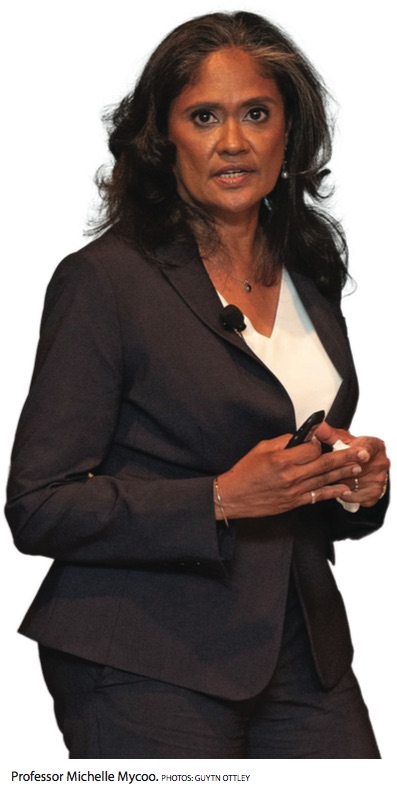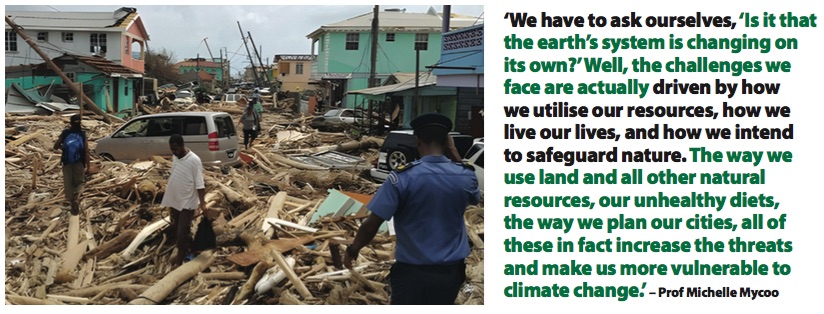
“We are vulnerable in the region, and we need to act now. We really need to ensure that our region urgently holds up to our responsibility of adapting to what we’re experiencing.”
This was the call of Urban and Regional Planning Professor Michelle Mycoo who delivered The UWI St Augustine’s first in-person professorial inaugural lecture since the COVID-19 pandemic. And while Mycoo was lauded for her many accomplishments, the message of her lecture was much more somber: as earth’s temperatures continue to rise, time is quickly running out to prevent the catastrophic results of climate change.
Mycoo began her lecture, titled “Caribbean Small Island Developing States on the Frontline: The Urgency for Climate Action”, with a quote from the most recent Intergovernmental Panel on Climate Change (IPCC) report:
“The scientific evidence is unequivocal: climate change is a threat to human well-being and the health of the planet. Any further delay in concerted global action will miss the brief, rapidly closing window to secure a livable future.”
Professor Mycoo was one of five scientists from The UWI and only 263 globally to contribute to the IPCC’s Working Group II report on Climate Change 2022: Impacts, Vulnerability and Adaptation. She served as a Coordinating Lead Author for the chapter on Small Islands.
While SIDS are Mycoo’s area of expertise, her call to action is global:
“We live on one planet, and what we have found in the scientific literature is that we are causing stress to nature and nature is responding by showing that it’s stressed. The earth is very delicate. It has ecosystems that are intimately woven. It’s like a tapestry, and as soon as you pull a thread out of it, it begins to unravel unless we do things to make adjustments over time,” she said.
Many of the statistics Prof Mycoo shared present a dire picture: Carbon dioxide concentrations are at the highest in 2 million years; sea level rise is the fastest in 3,000 years; and the arctic ice area and glacier retreat are at the lowest in 2,000 years. In the Caribbean, we are already experiencing temperature rises, growing impacts of storm surges, cyclones, droughts and changing precipitation patterns, rising sea levels, coral bleaching, and the entry of invasive species – all of which are having negative impacts on the economy, water supply, public health, agriculture, fisheries, and food security.
Part of the solution, however, includes major lifestyle changes, according to Mycoo.
“We have to ask ourselves, ‘Is it that the earth’s system is changing on its own?’ Well, the challenges we face are actually driven by how we utilise our resources, how we live our lives, and how we intend to safeguard nature. The way we use land and all other natural resources, our unhealthy diets, the way we plan our cities, all of these in fact increase the threats and make us more vulnerable to climate change. We are the drivers of some of the impacts we are seeing in the modern era,” the professor said.

Moreover, she shared that we are not on track to limit global warming. “At the moment, we are at 1.1ºC warming and we are not on track to limit warming to 1.5ºC. The moment we cross 1.5ºC, the SIDS are in trouble.”
A major research question to be answered was what are the solutions? According to Prof Mycoo, the answer is multifaceted.
“There is no single adaptation response. We have a combination of measures that we need to use,” she said.
She outlined various adaptation responses that are already in use, or options available to governments and communities. On the list were coastal protection, mangrove replanting, watershed management, coral reef restoration, rainwater harvesting, investing in urban green spaces, elevating buildings, traditional architecture, upgrading informal settlements, revised building codes, increasing technical capacity, and improving data quality/availability.
Prof Mycoo’s elevation to the rank of professor make her the first woman given these accolades in the Faculty of Engineering in 60 years. She was also the first Caribbean woman to serve as a Coordinating Lead Author on the IPCC report. Her research was further recognised when the IPCC was awarded the 2022 Gulbenkian Prize for Humanity.
As a scientist conducting research on SIDS for over 25 years, Mycoo has over 120 research publications, including a book. However, among the most fulfilling aspects of her work have been teaching and mentoring. At the lecture, her former students filled the space – such as Dr Sunil Laloo, who served as the open discussion moderator, and Annika Fritz-Browne who provided a vote of thanks.
Yet another former student, Imani Fairweather-Morrison, spoke about Prof Mycoo’s impact in education.
“I’ve had the distinct honour of being under the tutelage of Professor Mycoo, who we celebrate today. It has been an absolute pleasure taking her steer academically. She is precise. She has high expectations for excellence, but that is well balanced with deep love, care, and thoughtfulness for her students.”
It is clear that education is an extremely important aspect of Michelle Mycoo’s scholarship. When asked about the highlight of her career, rather than note awards or publications, the professor ended the evening by responding that she was most proud of her students’ achievements.